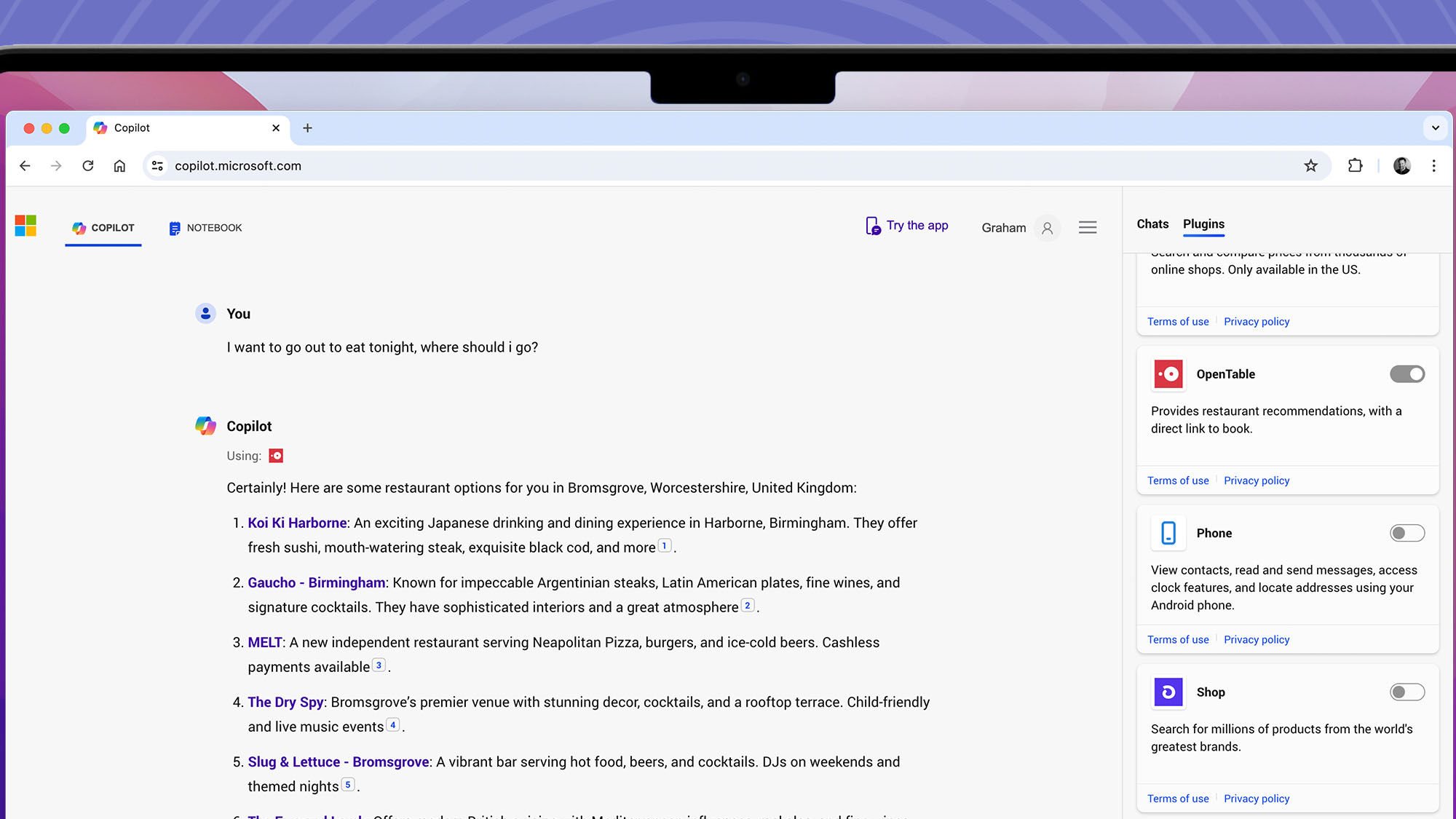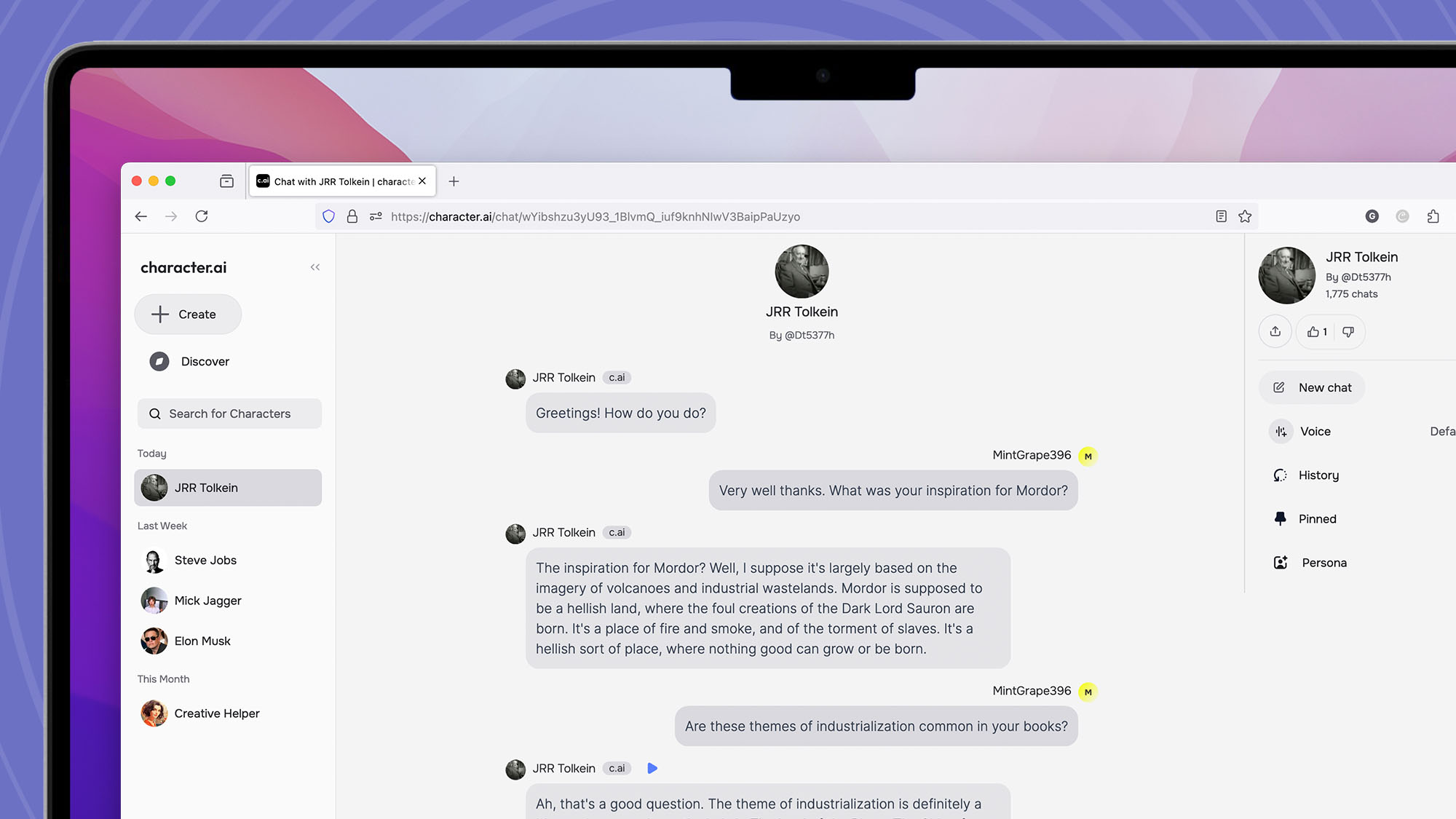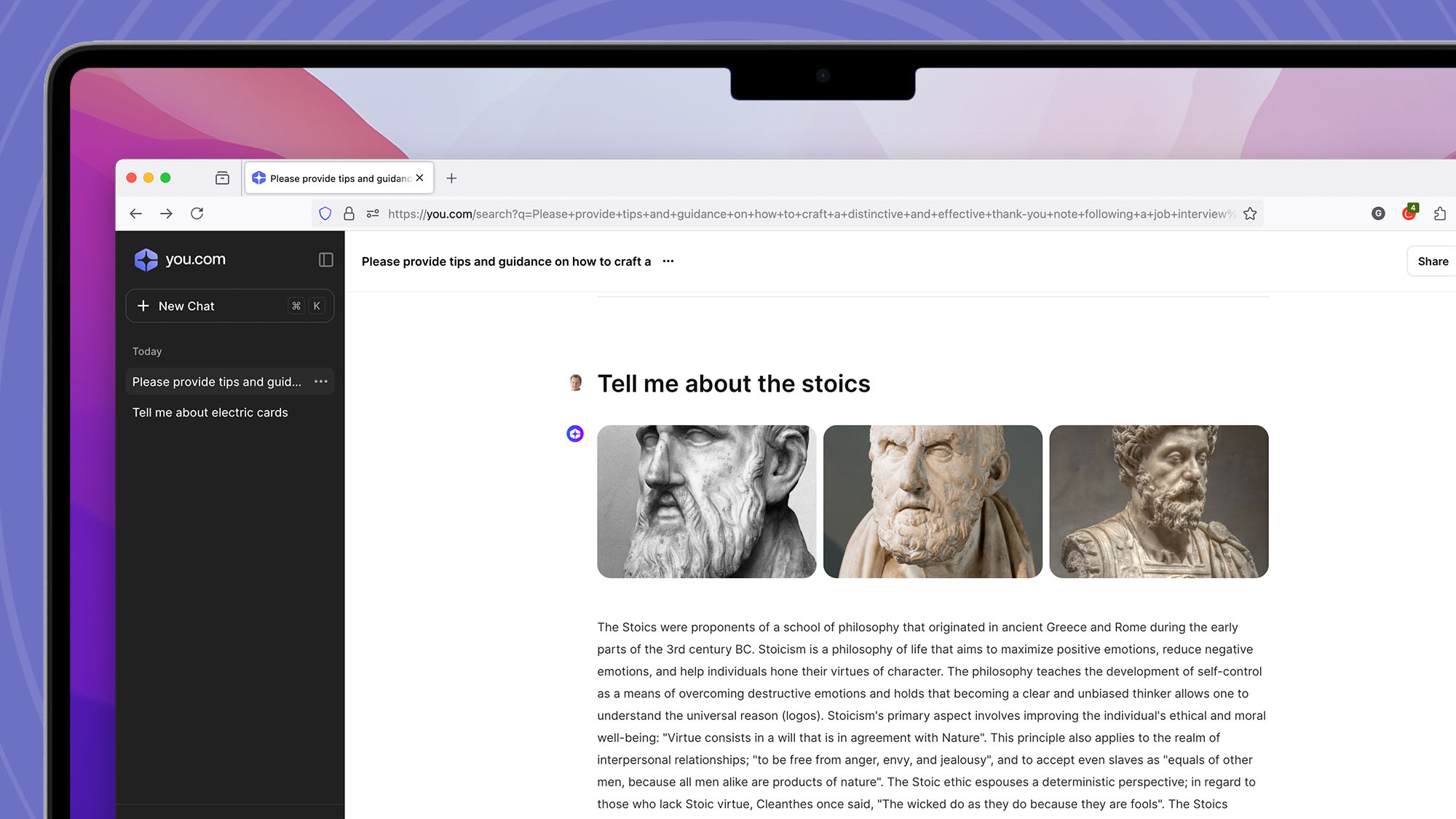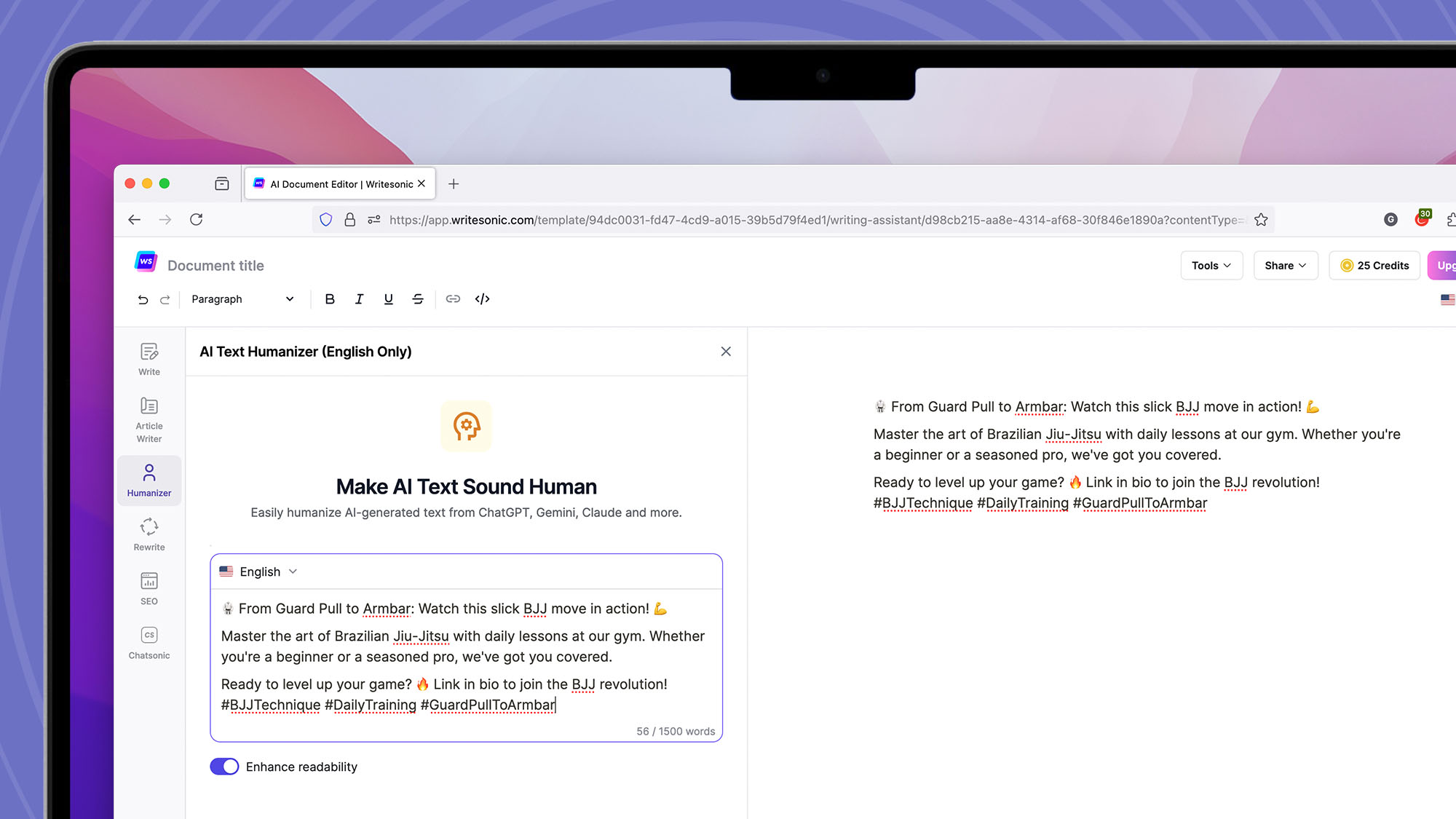ChatGPT alternatives: AI chatbots you can try for free
AI bots to try instead of ChatGPT, from Claude to Gemini via Copilot

For most people, ChatGPT was their first introduction to the world of AI. Thanks to OpenAI partnering with everyone from Microsoft to Apple, it’s taken the industry by storm.
Now, if Siri can’t answer your queries in iOS 18 on your iPhone using Apple Intelligence, then it will simply call its best friend, ChatGPT, to find the answer for you. Microsoft’s Copilot, which is built directly into Windows 11 and even has its own Copilot key on the keyboard to summon it, is based on ChatGPT-4’s model too, further cementing its place in history. The development of ChatGPT isn't slowing down either; it keeps going from strength to strength with a new ChatGPT-4o mini model recently rolled out, which is much faster than previous versions.
But while it gets all the attention, ChatGPT isn’t your only option for generating AI text responses from prompts. There are a lot of other chatbots on the web that you can use for free, and they are sometimes customized for specific purposes.
Here we’ve gathered several alternatives to OpenAI’s ChatGPT that you might want to try out instead. From Claude to Gemini, these chatbots will give you a different slant on talking to a machine pretending it's a human. Many of them have paid tiers, but all of them have a version you can try for free.
Claude
Lots of people love Claude.ai, or just Claude for short, preferring it to the mighty ChatGPT and the rest. Claude is currently based on the Sonnet 3.5 model, which offers many improvements over the previous Opus 3 model, such as better writing quality, humor and coding proficiency. It's also twice as fast as the previous version.
Like ChatGPT, you can upload images and documents to Claude and get it to analyze them, so you can upload a book cover and ask it what the book is about, for example. Or you could upload a text document and get it to produce an outline or analyze the main themes.
There are no image generating abilities in Claude though, so don't expect it to draw you a sketch or reproduce a famous artwork.
Sign up for breaking news, reviews, opinion, top tech deals, and more.
Apart from the image creation, the main drawback of Claude is that on the free tier you are quite limited in how many messages you can generate in a day, so don't use them up on superfluous questions.
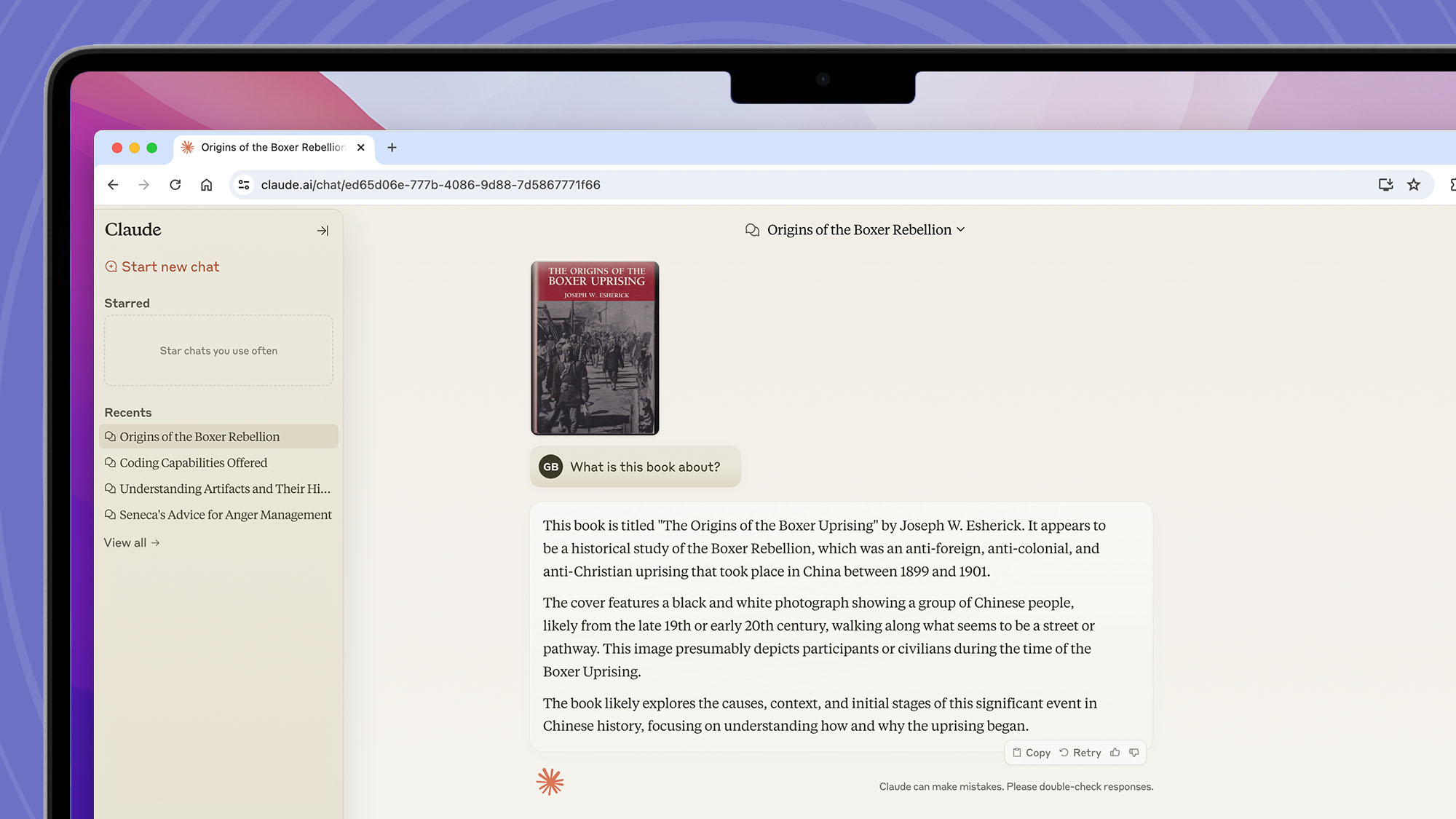
Claude.ai is great at producing code. For example, ask Claude to create a Python script for a text adventure set in a forest where you discover and interact with magical items and it produces the code for you straight away. Claude doesn't have the ability to run the code it creates, but it can break it down for you and explain it.
Upgrading to the Pro version of Claude ($20, £16, AU$30) will get you five times more usage vs the free plan, plus the ability to use two of its best features: Projects and Artifacts.
Artifacts make it easy to work on larger pieces of content in a separate window from the main Claude chat, so you can see the results of your changes. This way you can keep making adjustments to your work without it continually scrolling off the screen. Projects are self-contained workspaces that remember your preferences and what you've asked so far, so you can come back to a project without a 'cold start'.
Copilot
If you’re looking for a ChatGPT alternative that’s the most similar to it, then Microsoft’s Copilot, previously known as Bing Chat, is the AI bot for you. This AI-powered version of the company’s search engine runs on the same framework as ChatGPT, so its answers and abilities should be pretty similar to those of its virtual cousin.
You only get five questions on Copilot before it forces you to start a new chat, which is a bit limiting, but Copilot has one advantage over the likes ChatGPT and Claude - it can search the web using the Bing search engine. So, if you ask it for the best headphone deals, you'll get links to the actual deals, just as you would in a regular search engine.
You can ask Copilot all the usual AI questions too, plus you can upload an image for it to analyze, or speak to it using your microphone.
One of the best features of Copilot is the ability to add plugins, which are accessible from the menu on the right-hand side of the page, for things like Opentable, which provides restaurant recommendations with a direct link to book, or Instacart, which you can use to order groceries and ask about recipes.
For $20 a month you can upgrade to Copilot Pro and get quicker responses, integration with Microsoft Office apps, and enhanced image creation with DALL-E 3.
Gemini
Instead of Copilot, Claude or ChatGPT, you could try Gemini (previously known as Bard), the chatbot from Google. Gemini is exactly what you'd expect from the biggest name in search: part search engine and part AI chatbot. So, as well as chatting away like ChatGPT can on pretty much any subject it can also search the web. You can ask it for the name of some blogs on a particular subject, or what the best laptop deals are, and you'll get an answer with links to the websites concerned.
As well as chatting to Gemini you can upload images for it to analyze and even get it to write code for you, but it can't draw images, even in the Advanced version, and there are none of the plugins that Copilot offers.
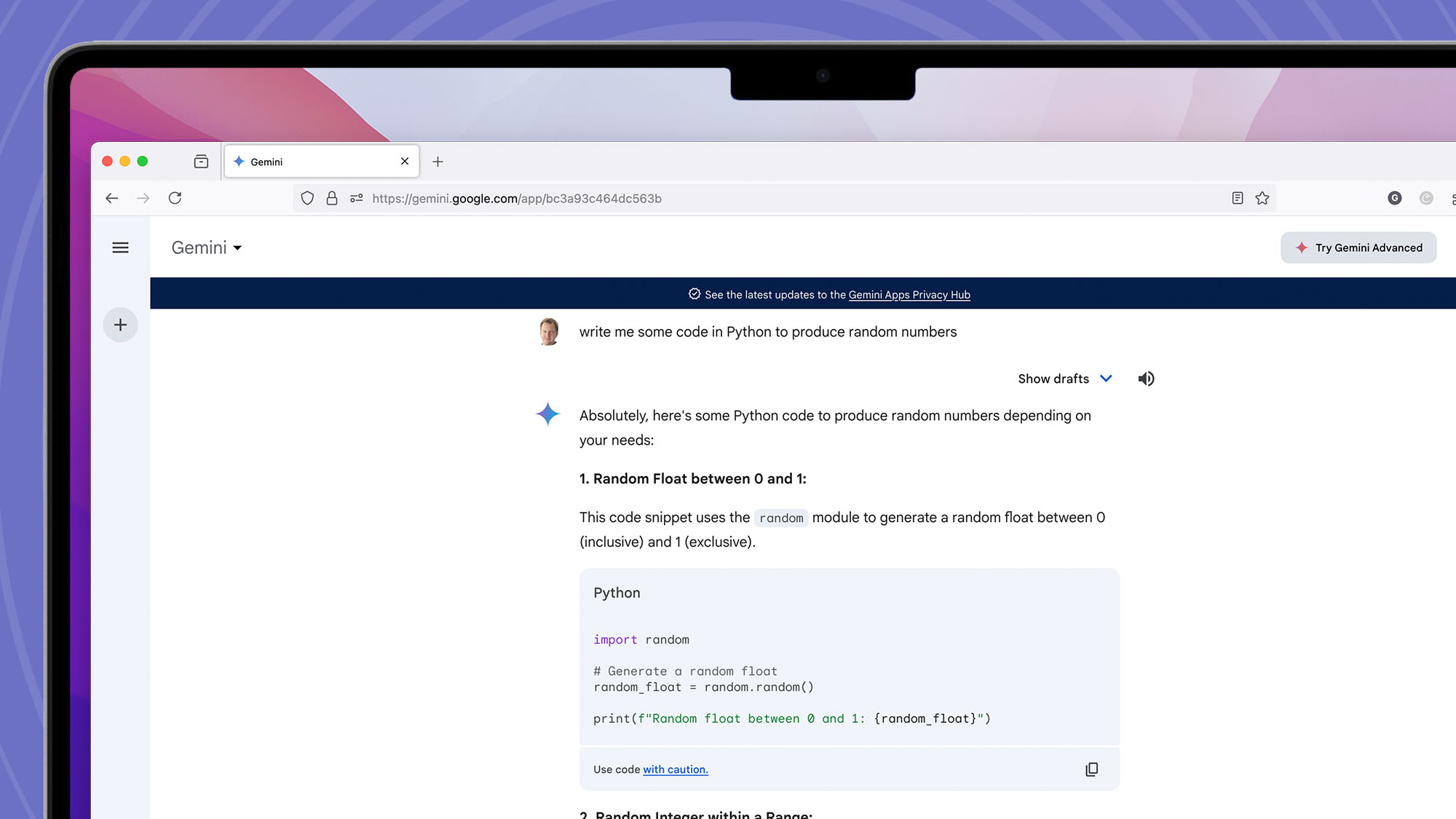
Gemini is the banner under which Google has chosen to bring together all its different AI offerings, so as well as a free version there's also Gemini Advanced, which comes as part of the Google One AI Premium plan for $19.99 (£18.99/AU$32.99) a month and gives you all the Google One Premium benefits, like 2TB of storage, together with access to Googles next generation 1.5 Pro model for AI and more capacity to process information and upload documents.
Your mobile options are very strong with Gemini - not only is it built into the latest Samsung phones, but there's a dedicated Gemini app for Android phones and it's part of the free Google app on iOS devices.
Perplexity
Perplexity is officially a search engine, rather than an AI chatbot, but it functions pretty much like one, so we're including it here.
The design of the Perplexity web page is clearly an attempt to mimic ChatGPT, even down to similar colors. But Perplexity isn't simply a front end for ChatGPT, it uses its own Perplexity AI model for the responses you get. You can get unlimited quick searches a day too, with a limit of five Pro searches, which are for more complex questions.
As well as the unlimited questions, what we like most about Perplexity is the four links to the sources of the information it's giving you at the top of each response. You also get image search results in the right-hand column, which is a nice touch and helps you get a better overall understanding of the answer.
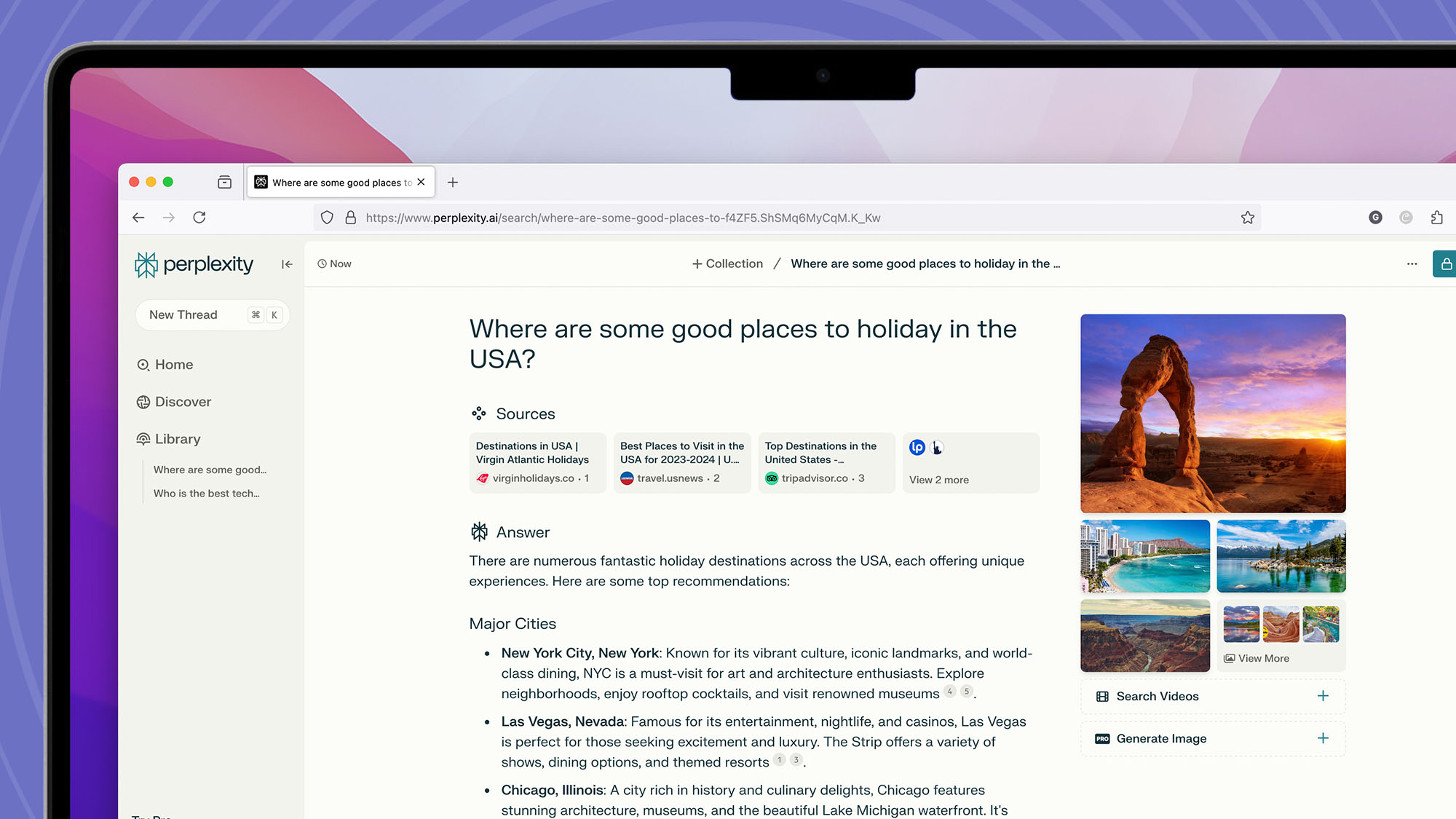
On the free tier, Perplexity can't upload images to analyze, or draw images, but you can upload text and PDF documents for it to process, but you're limited to three a day. We have to say that we noticed a few small errors in the responses, which is not uncommon for a chatbot, so make sure you check the sources it quotes.
For $20 a month you can upgrade to Perplexity Pro which gives you unlimited quick searches and 20 Pro searches a day. On the Pro plan you can visualize 30 images a day using different image generators, including DALL-E. You can also select your preferred AI model to use, from ChatGPT, Claude-3, Sonar Large and more.
Mobile versions of Perplexity are available for Android and iOS.
Character.AI
Character.AI is the best option on this list if you want to converse with an AI, though its service is more of a novelty than a helpful tool.
You can sign up for free using your email address, and you’ll then be able to have lengthy conversations with bots that are designed to chat as if they were a specific real-life person or fictional character. You can discuss science with Albert Einstein, Twitter drama with Elon Musk, and the goings on in Bikini Bottom with SpongeBob – or at least with AI approximations of these figures.
I particularly enjoyed talking to the AI Keanu Reeves about film, with the synthetic version of the action hero giving off the same kind-hearted energy as the kosher Keanu.
However, the chats aren’t particularly meaningful and lack the depth you’d expect when talking with an ‘expert’ in a specific field.
For example, I tried to get ‘Albert Einstein’ to explain special relativity to me (a theory the legendary physicist developed), but the bot could only provide me with very basic information about the relationships between mass, time, speed, and length in this framework.
The information was accurate, but when I asked it to explain the ideas and expand on them it dodged the question, calling the subject “complicated.” That’s certainly an apt description, but we do know the reasoning behind special relativity, and a supposedly intelligent artificial Einstein should have been able to explain these ideas.
If you’re looking for a fine way to waste an hour or two then Character.AI is fun, but if you want a helpful AI it’s not the option for you.
You.com
You.com is a front end for a variety of different AI models, like ChatGPT, Claude and Gemini, but it’s free to use, although it typically limits you to three questions on each model, unless you go for YouPro+, which costs $20 a month (about £16/ AU$30) and gives you unlimited questions, and a choice of which AI model to use. There's a big discount for paying annually, which is quite a good deal.
It does, however, have a couple of issues.
Your queries per day using the premium large language models on the free tier runs out very quickly and you're left using its Smart Assistant.
While you should always take an AI bot’s advice and answers with a pinch of salt, I found that the Smart Assistant's responses to my queries – which ranged from finding out about the latest Deadpool and Wolverine movie to asking for a breakdown of current US political events – were fairly inaccurate. It got the release date of the film wrong and didn't really know what it was about. It fared better on current political events though.
As a quick and easy interface for chatting to an AI we quite liked You.com's format, but it's only really worth it if you upgrade to YouPro+, at which point you get access to so many different AI models you'll be spoilt for choice.
There are mobile app versions of You.com for Android and iOS.
Socratic
Socratic is a nifty AI that you can download to your iPhone or Android smartphone to help with homework questions that have you stumped. You can have it read questions using your camera, or ask it yourself using the voice assistant, and Socratic won’t just tell you the answer it will explain why that’s the answer too by providing links to answers from the web.
This app can help you better understand a whole load of different topics from science like biology and physics, to math essentials like algebra and trigonometry, and even poetry for your English classes. It’s pretty broad for a free service, though admittedly its knowledge isn’t endless – so you might find it won’t be able to assist you with every subject you’re struggling to wrap your head around.
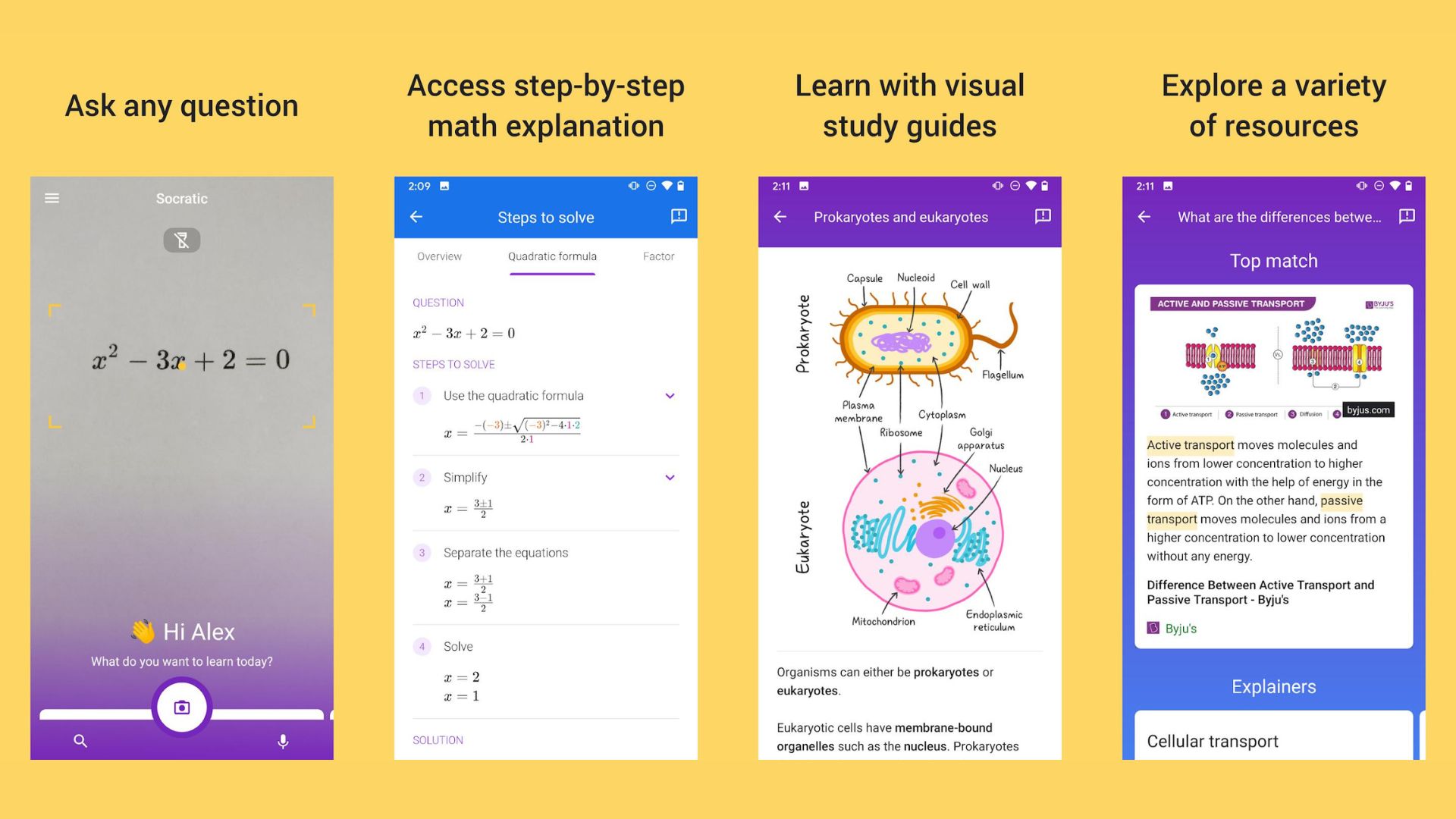
We wouldn’t recommend using the app to just cheat your way through all the homework you’ve been set, instead, we'd suggest asking it for help with the odd question you’re stuck on and then using what it teaches you to solve the rest yourself. This can be a fantastic way to learn a subject, as you aren't just blindly copying answers, you're learning why the answer to the question is the answer and then applying that new knowledge.
Even if your school teacher is fantastic their way of explaining a topic might not have clicked with you, but perhaps the explanations provided by Socratic will finally help you get to grips with a tough subject.
The iOS app is currently not available in the UK.
WriteSonic
WriteSonic, a productivity-focused AI, can produce articles, adverts, social media posts, emails and content ideas, and humanize the writing, so that it doesn't sound too much like a chatbot has written it. It can also generate AI art images too, but we found the results were a little artificial.
Its content generation process is a little different to using a chatbot like ChatGPT. It's designed with a task in mind. You simply select which type of content you want to generate, say an article, an email or a social media post and then answer whatever questions it asks you about the subject until it finally generates the content.
WriteSonic also has a chatbot function, called ChatSonic, that works like most of the chatbots in this article. However, ChatSonic is just a part of the whole WriteSonic feature set , and isn't really the purpose of the product. WriteSonic has a good set of features if you want to create content using AI for marketing, social media or web creation, but we wouldn't turn to it for general AI needs in favour of the other big products presented here.
WriteSonic is free to use and sign up for, but the free version is limited; you only get 25 credits, and generating an article uses up 20. You don’t need to provide payment information to try WriteSonic though, and if you like the service you can upgrade to the paid plan for $20 per month (around £16/AU$30).
You might also like

Graham is the Senior Editor for AI at TechRadar. With over 25 years of experience in both online and print journalism, Graham has worked for various market-leading tech brands including Computeractive, PC Pro, iMore, MacFormat, Mac|Life, Maximum PC, and more. He specializes in reporting on everything to do with AI and has appeared on BBC TV shows like BBC One Breakfast and on Radio 4 commenting on the latest trends in tech. Graham has an honors degree in Computer Science and spends his spare time podcasting and blogging.
- Hamish HectorSenior Staff Writer, News
